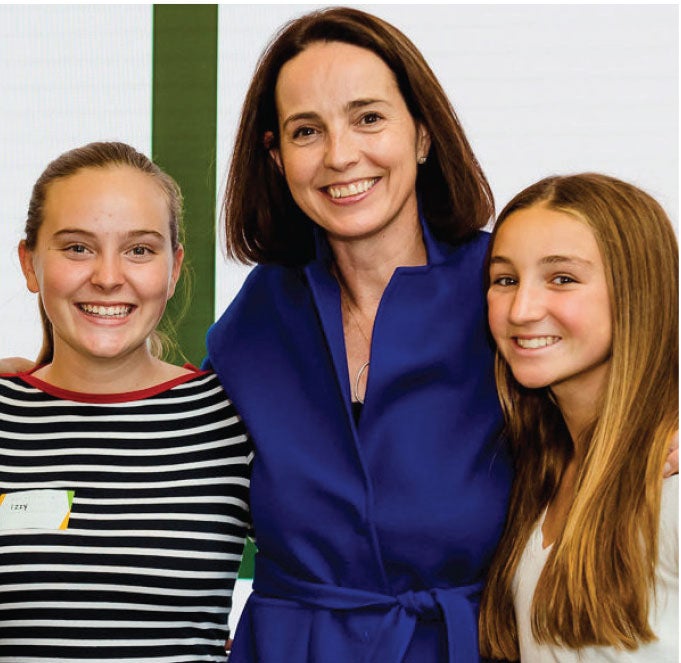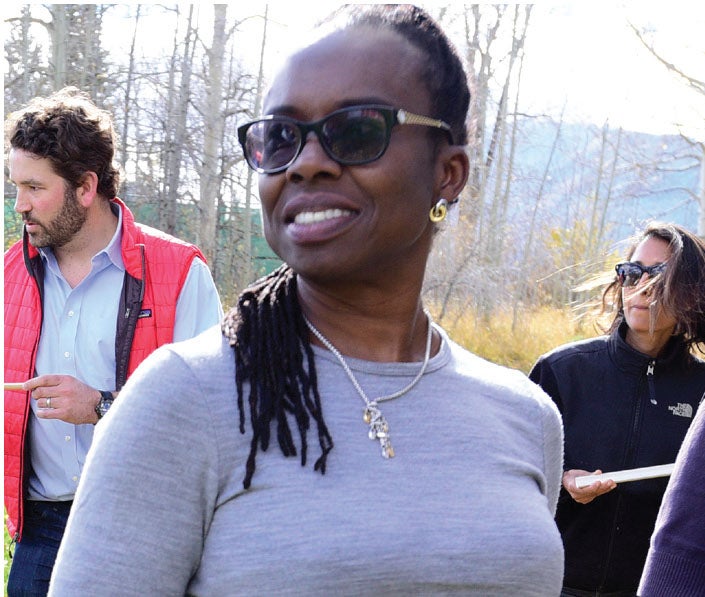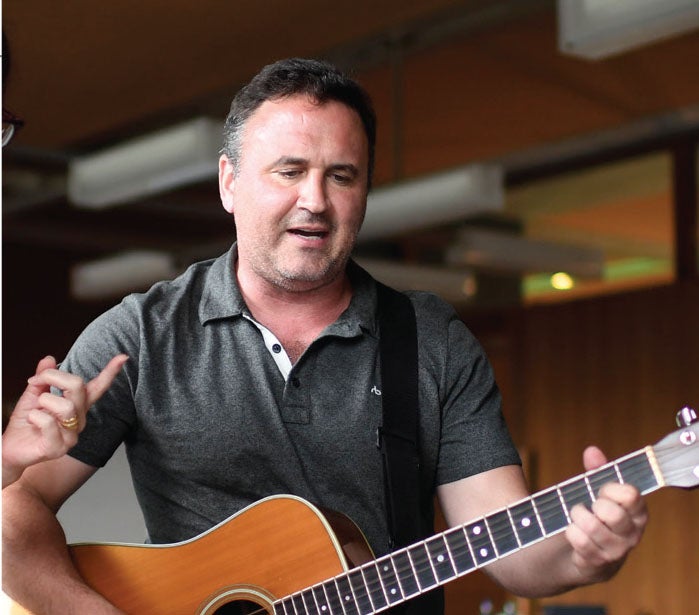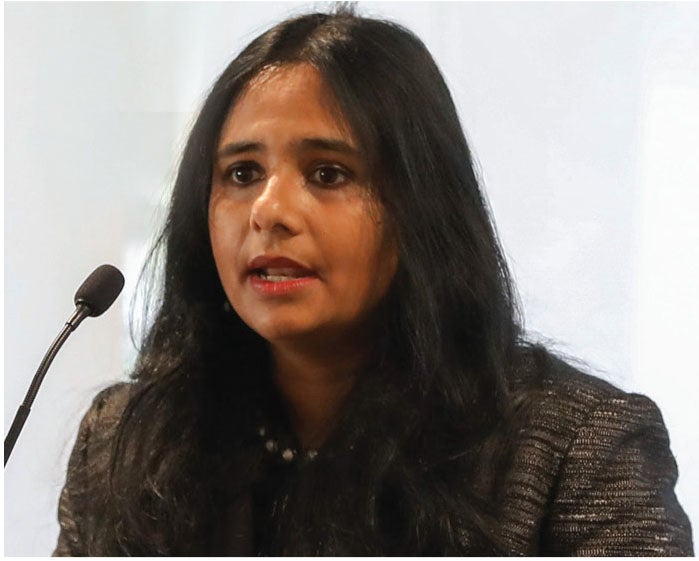This article was originally printed in the Winter 2018/2019 issue of IDEAS: the Magazine of the Aspen Institute.
Ranji Nagaswami knew the finance industry could be a compelling force for good with more effective and enlightened leaders as part of the equation. So she looked to her own experiences at the Institute—and created the Finance Leaders Fellowship.
The 2007–2008 financial crisis led to devastating global economic fallout, human dislocation, and an erosion of trust in the finance industry—for a reason. Many of the unsustainable business practices of the US banking and credit sectors led to the crisis. Yet over time, the finance industry has also provided many people a shot at prosperity, progress, and stability. With innovations like pensions, mutual funds, savings accounts, mortgage credit, and insurance, the finance industry—when its tools are used responsibly—can be a force for good.
This was the paradox that Henry Crown fellow Ranji Nagaswami was contemplating. Deeply believing in the Aspen fellowship experience and the notion that leaders shape industries and companies, Nagaswami launched the Finance Leaders Fellowship program at the Institute, with lead founding support from Christopher Varelas of Riverwood Capital and the CFA Institute, a nonprofit global association of chartered financial analysts. Her premise: with enlightened leaders, the financial-services industry could improve its connection with society and design its products and business models to explicitly account for human foibles. The Aspen Global Leadership Network’s theory of change would be put to work: select influential industry leaders to build a community of trusted peers, engage them in thought-provoking dialogue, and—most important—inspire them to act.
In October 2018, the inaugural class of 22 Finance Leaders fellows completed the two-year active phase of the fellowship. Fellows hail from around the world and across the financeindustry ecosystem, including financial services, pensions and endowments, and regulatory posts. In addition to active dialogue at four weeklong seminars, each fellow designed a venture project focused on her or his industry and put into practice leadership lessons learned. Here are four of the 63 Finance Leaders fellows on how the fellowship inspired them to act.
Sarah Friar
 CEO of NextDoor, a neighborhood social-networking service based in San Francisco; former CFO of Square
CEO of NextDoor, a neighborhood social-networking service based in San Francisco; former CFO of Square
I have made choices that I probably would not have made, such as accepting the offer to be a director on the board of Walmart recently. When I was asked, I had just returned from the Aspen seminar, where I talked with my fellows about whether we were doing enough to make a change on a global scale or in a broader way. We are leaders who can do that. Reading Aristotle and other classics, then discussing it with folks working at a similar scale and level as mine helped us build a deep sense of trust. My fellows helped me make this decision, even though I didn’t feel I had time to take anything else on. Walmart is a company that employs 1.8 million people in the United States, so on that scale, I can help make a big difference.
Tokunboh Ishmael
 Founder of Alitheia Capital, a private-equity firm based in Nigeria, and a CFA Institute charter holder
Founder of Alitheia Capital, a private-equity firm based in Nigeria, and a CFA Institute charter holder
The fellowship inspired me to think big about what I could do to help my region of the world through finance. For a long time, I have seen the need for Nigerians to be able to save money for their futures, but there is no great way to do it. I’ve been inspired by the other fellows and our readings and discussions, and I also relied a bit on the architecture that the fellowship has provided for venture development. I also collaborated with the CFA Society of Atlanta to learn more about what they do in the area of financial literacy and have launched my first step in the process of producing a card game designed to educate folks on why it is important to save for the future or for a rainy day. The next step will be to develop a technology solution to enable savings in a low-cost way.
Tim Fazio
 Co-Founder and Managing Partner of Atlas Holdings, a private-equity firm based in Connecticut
Co-Founder and Managing Partner of Atlas Holdings, a private-equity firm based in Connecticut
I’ve learned so much through debating our readings and talking with other fellows from around the world about things like the business climate in Asia that have a real impact on my current business. But on top of that, issues like the challenge of opioid use for employers, how automation is going to affect the workforce, and diversity and inclusion. For my venture, I’ve established a company called Industrial.Exchange to bring together operators and investors in middle-market manufacturing companies to explore some of these issues. I’ve been able to collaborate with other fellows and Institute programs to have a robust and effective agenda for our first gathering, happening in May 2019.
Aparna Ramesh
 Senior Vice President and CFO of the Federal Reserve Bank of Boston
Senior Vice President and CFO of the Federal Reserve Bank of Boston
How do we make even the smallest amounts of money work for people who feel they have too little to save or invest? I can remember vividly a small-group venture discussion during our second seminar when one colleague shared how he was working on impact investments focused on the environment. Another talked about his venture that enables access to reasonably priced loans for foreign domestic workers in Southeast Asia and provides free debt counseling and low-interest loans. Hearing their passion sparked me to organize a conference on financial inclusion and fintech to expand thought leadership within the Boston Federal Reserve and financial and technology community. It was really powerful to be part of inspiring action. Doing the right thing is also right for business.

